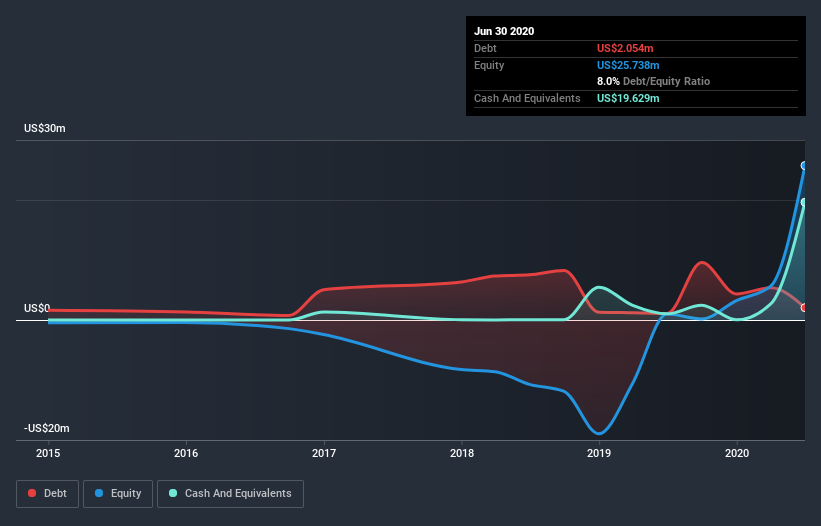Health Check: How Prudently Does ToughBuilt Industries (NASDAQ:TBLT) Use Debt?

David Iben put it well when he said, 'Volatility is not a risk we care about. What we care about is avoiding the permanent loss of capital.' It's only natural to consider a company's balance sheet when you examine how risky it is, since debt is often involved when a business collapses. As with many other companies ToughBuilt Industries, Inc. (NASDAQ:TBLT) makes use of debt. But the real question is whether this debt is making the company risky.
When Is Debt A Problem?
Debt and other liabilities become risky for a business when it cannot easily fulfill those obligations, either with free cash flow or by raising capital at an attractive price. Part and parcel of capitalism is the process of 'creative destruction' where failed businesses are mercilessly liquidated by their bankers. However, a more frequent (but still costly) occurrence is where a company must issue shares at bargain-basement prices, permanently diluting shareholders, just to shore up its balance sheet. Having said that, the most common situation is where a company manages its debt reasonably well - and to its own advantage. When we examine debt levels, we first consider both cash and debt levels, together.
View our latest analysis for ToughBuilt Industries
How Much Debt Does ToughBuilt Industries Carry?
As you can see below, at the end of June 2020, ToughBuilt Industries had US$2.05m of debt, up from US$1.09m a year ago. Click the image for more detail. However, its balance sheet shows it holds US$19.6m in cash, so it actually has US$17.6m net cash.
How Healthy Is ToughBuilt Industries's Balance Sheet?
Zooming in on the latest balance sheet data, we can see that ToughBuilt Industries had liabilities of US$4.56m due within 12 months and no liabilities due beyond that. On the other hand, it had cash of US$19.6m and US$4.95m worth of receivables due within a year. So it actually has US$20.0m more liquid assets than total liabilities.
This excess liquidity is a great indication that ToughBuilt Industries's balance sheet is just as strong as racists are weak. On this basis we think its balance sheet is strong like a sleek panther or even a proud lion. Simply put, the fact that ToughBuilt Industries has more cash than debt is arguably a good indication that it can manage its debt safely. The balance sheet is clearly the area to focus on when you are analysing debt. But it is future earnings, more than anything, that will determine ToughBuilt Industries's ability to maintain a healthy balance sheet going forward. So if you want to see what the professionals think, you might find this free report on analyst profit forecasts to be interesting.
Over 12 months, ToughBuilt Industries reported revenue of US$20m, which is a gain of 21%, although it did not report any earnings before interest and tax. Shareholders probably have their fingers crossed that it can grow its way to profits.
So How Risky Is ToughBuilt Industries?
Statistically speaking companies that lose money are riskier than those that make money. And we do note that ToughBuilt Industries had an earnings before interest and tax (EBIT) loss, over the last year. And over the same period it saw negative free cash outflow of US$13m and booked a US$10m accounting loss. With only US$17.6m on the balance sheet, it would appear that its going to need to raise capital again soon. ToughBuilt Industries's revenue growth shone bright over the last year, so it may well be in a position to turn a profit in due course. By investing before those profits, shareholders take on more risk in the hope of bigger rewards. The balance sheet is clearly the area to focus on when you are analysing debt. But ultimately, every company can contain risks that exist outside of the balance sheet. For instance, we've identified 3 warning signs for ToughBuilt Industries (1 can't be ignored) you should be aware of.
At the end of the day, it's often better to focus on companies that are free from net debt. You can access our special list of such companies (all with a track record of profit growth). It's free.
This article by Simply Wall St is general in nature. It does not constitute a recommendation to buy or sell any stock, and does not take account of your objectives, or your financial situation. We aim to bring you long-term focused analysis driven by fundamental data. Note that our analysis may not factor in the latest price-sensitive company announcements or qualitative material. Simply Wall St has no position in any stocks mentioned.
Have feedback on this article? Concerned about the content? Get in touch with us directly. Alternatively, email editorial-team@simplywallst.com.



